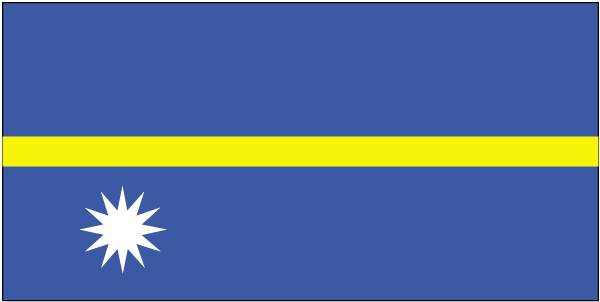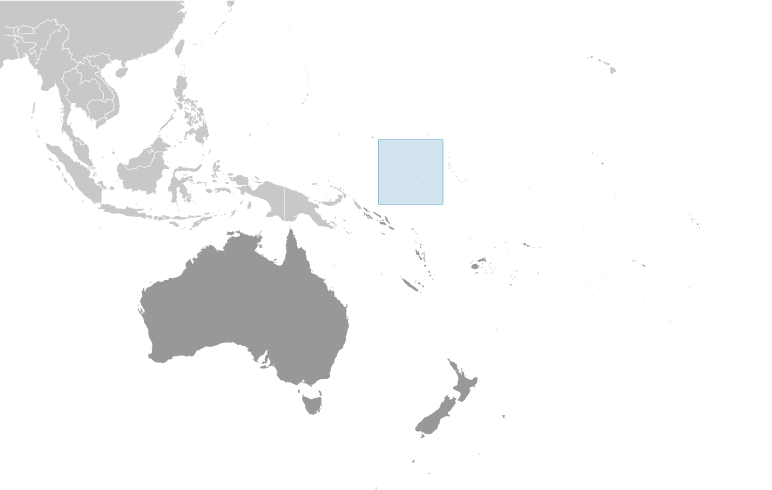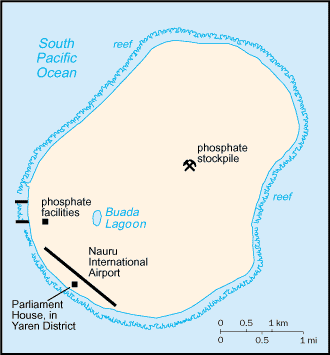The exact origins of the Nauruans are unclear since their language does not resemble any other in the Pacific. The island was annexed by Germany in 1888. Its phosphate deposits began to be mined early in the 20th century by a German-British consortium. Nauru was occupied by Australian forces in World War I and subsequently became a League of Nations mandate. After the Second World War - and a brutal occupation by Japan - Nauru became a UN trust territory. It achieved independence in 1968 and joined the UN in 1999 as the world's smallest independent republic.
Population
14,264 (July 2010 est.)
Country comparison to the world:222
Nationality
Noun:Nauruan(s)
Adjective:Nauruan
Ethnic groups
Nauruan 58%, other Pacific Islander 26%, Chinese 8%, European 8%
Religions
Nauru Congregational 35.4%, Roman Catholic 33.2%, Nauru Independent Church 10.4%, other 14.1%, none 4.5%, unspecified 2.4% (2002 census)
Languages
Nauruan (official; a distinct Pacific Island language), English widely understood, spoken, and used for most government and commercial purposes
Country Name
Conventional long form:Republic of Nauru
Conventional short form:Nauru
Local long form:Republic of Nauru
Local short form:Nauru
Former:Pleasant Island
Government Type
republic
Capital
no official capital; government offices in Yaren District
Time difference:UTC+12 (17 hours ahead of Washington, DC during Standard Time)
Administrative divisions
14 districts; Aiwo, Anabar, Anetan, Anibare, Baiti, Boe, Buada, Denigomodu, Ewa, Ijuw, Meneng, Nibok, Uaboe, Yaren
Independence
31 January 1968 (from the Australia-, NZ-, and UK-administered UN trusteeship)
National Holiday
Independence Day, 31 January (1968)
Constitution
29 January 1968; amended 17 May 1968
Legal system
acts of the Nauru Parliament and British common law; accepts compulsory ICJ jurisdiction with reservations
Suffrage
20 years of age; universal and compulsory
Executive branch
Chief of state:President Marcus STEPHEN (since 19 December 2007); note - the president is both the chief of state and head of government
Head of government:President Marcus STEPHEN (since 19 December 2007); note - President Ludwig SCOTTY was defeated in a no confidence vote in parliament on 19 December 2007
Cabinet:Cabinet appointed by the president from among the members of parliament
(For more information visit the World Leaders website)
Elections:president elected by parliament for a three-year term; election last held on 19 December 2007 (next to be held in 2010)
Election results: NA
Legislative branch
unicameral parliament (18 seats; members elected by popular vote to serve three-year terms)
Elections:last held on 24 April 2010 (next to be held in 2013); note - President Marcus STEPHEN called a snap election to break a parliamentary stalemate blocking legislative action
Election results:percent of vote - NA; seats - independents 18
Judicial branch
Supreme Court
Political Parties and Leaders
Democratic Party [Kennan ADEANG]; Nauru First (Naoero Amo) Party; Nauru Party (informal); note - loose multiparty system
Political pressure groups and leaders
Woman Information and News Agency (women's issues)
International organization participation
ACP, ADB, AOSIS, C, FAO, ICAO, ICCt, Interpol, IOC, ITU, OPCW, PIF, Sparteca, SPC, UN, UNCTAD, UNESCO, UPU, WHO
Diplomatic representation in the US
Chief of mission:Ambassador Marlene I. MOSES
Chancery: 800 2nd Avenue, Suite 400 D, New York, NY 10017
Telephone:[1] (212) 937-0074
FAX:[1] (212) 937-0079
Consulate(s):Agana (Guam)
Diplomatic representation from the US
the US does not have an embassy in Nauru; the US Ambassador to Fiji is accredited to Nauru
Flag description
blue with a narrow, horizontal, yellow stripe across the center and a large white 12-pointed star below the stripe on the hoist side; the star indicates the country's location in relation to the Equator (the yellow stripe) and the 12 points symbolize the 12 original tribes of Nauru










